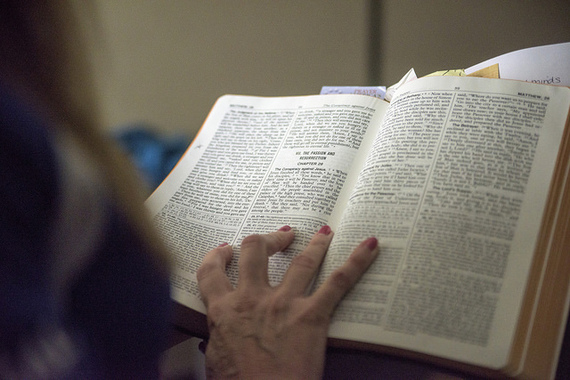
I share a story in my book, Going Gay, about teaching on the topic of pro-gay theology at a seminar hosted by Concerned Women for America. It was around the early '90s, and I was a young, "ex-gay" man entrenched in the fundamentalist church, and a leader in the conversion therapy movement at the time.
Naturally, the people who attended the seminar believed that homosexuality was sinful. They came to the class to understand how gay Christians "wrongly" interpret the Bible. As I completed my teaching on the subject, calling out misused and ill-quoted Scriptures by LGBT people whom we all believed only wanted to justify their sin, an elderly man sat in the back, quietly, but intently listening. He meekly raised his hand and said, "I came here today to find out what you had to say, but I didn't think you were going to attack my church."
I explain in the book:
"While I was still trying to get my bearings, people in the crowd launched theological missiles and, in no uncertain terms, told him to be quiet. He was outnumbered with no place to go. He could only withdraw and retreat... I quickly dismissed the thought that there was no fair discussion on the topic in favor of proliferating our true message of change and deliverance. I had done my job and, by almost all accounts, I had done it well."
What I couldn't see, and wouldn't see for several decades, was that my religious zeal wasn't just a difference of opinion; it was a life-crushing dogma. He could no more separate his sexual orientation from who he is than any heterosexual person could separate his. I didn't know that at the time. My ignorance and intolerance was justified solely on the belief that I was right and he was wrong.
As a fundamentalist Christian, I was not only obliged to my version of truth, I was enslaved by it. Defending what I believed was truth had become a god itself. After all, I had been taught that Jesus is the Word of God (John 1:1) and the entirety of who God is, is found only between the pages of one very small book. Furthermore, the only true interpretation of that book was my fundamentalist theology.
While years of experience and education led me to change my position on God, sexuality and a host of other topics, I understand the millions of fundamentalists - Christian, Muslim and otherwise - who are still trapped in a theology which values words on a page over human lives.
Most are not terrorists. In fact, most are good people who want to do the right thing. Many suffer the mental conflict between wanting to love people as they are, and needing to keep their distance because they are afraid of being pulled into sin, losing their salvation, or fear God will send them to hell. I can't even count how many conversations I have had with people that ended with, "But what if I'm wrong?"
When I went through the mental turmoil of leaving my fundamentalist faith, I thought a lot about my children. I was taught that God loved my children more than I did. Yet, I, for the life of me, couldn't imagine anything they could do that would cause me to want to see them tortured for all of eternity, let alone be cast away from me. I still can't. And believe me, now as teenagers, they try my patience more than ever. If that's how I feel, then I imagined God must love even harder.
I've written often about the 41,000 versions of Christianity, some of which, such as fundamentalism, don't consider the others Christians at all. I determined, as an educator myself, that God could have done a much better job of making His message clearer, if it was indeed THE TRUTH.
If I could go back and talk to that elderly man who attended my class, I would tell him that, even though I didn't understand him at the time, he mattered. His life was valuable to me because it was valuable to God. I wouldn't be so sure of myself, or what I said I believed, especially if it meant creating a barrier between one human to another. I was wrong. If God is as all-powerful as fundamentalists say he is, then He cannot be contained between the pages of a single book and it is presumptuous at best to assume anyone can know or speak for God.
Photo - Flickr/Catholic Diocese of Saginaw
